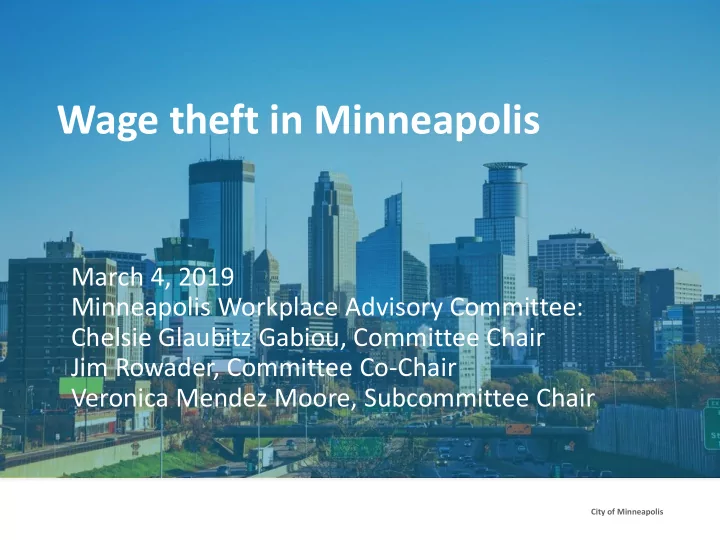

Wage theft in Minneapolis March 4, 2019 Minneapolis Workplace Advisory Committee: Chelsie Glaubitz Gabiou, Committee Chair Jim Rowader, Committee Co-Chair Veronica Mendez Moore, Subcommittee Chair City of Minneapolis
Workplace Advisory Committee • Chelsie Glaubitz Gabiou, Minneapolis Regional Labor Federation • Jim Rowader, Target Corporation • Molly Glasgow, Metro Independent Business Alliance • Veronica Mendez Moore, Centro de Trabajadores Unidos en Lucha (CTUL) • Chris Conry, Take Action MN • Brian Elliott, Service Employees International Union (SEIU) • Kate Davenport, Eureka Recycling • Mae Brooks, Minneapolis Parks & Recreation Board • Ben Schweigert, Public employee (and licensed attorney) • Wintana Melekin, Main Street Alliance • Natalie Martin, Old Republic Title • Tristan Jimerson, Taco Cat Restaurant • Wade Luneberg, UNITE Here • Ginger Jentzen, 15 Now • Rebecca Lucero, formerly of MN Council of Nonprofits
What is Wage Theft? Underpayment or failure to pay all wages owed, including: • Working off-the-clock • Not receiving time and a half for overtime • Working far more hours than promised for a flat rate • Misclassification as an independent contractor • Unlawful deductions from paychecks • No payment at all • Not receiving paid breaks • Not being paid sick & safe time • Having hours shaved off of paychecks • Willfully sloppy or fraudulent payroll practices
Is Wage Theft Common? YES. • Local surveys find more than half of hourly workers directly affected. • The most vulnerable 17% of low wage workers lose nearly a quarter of their earnings to wage theft. • A 2009 survey in major cities found that approximately 66% of low wage workers experienced wage theft within the previous week. • Wage theft is under-reported to authorities by tens of millions annually in Minneapolis (estimated $600 million statewide). • Black and Latinx workers are, respectively, greater than three and four times more likely than whites to be victimized. • 100% of workers (everyone) pays higher payroll taxes due to fraud, and downward pressure on wages is imposed across entire industries. • The dollar value of all wage theft is estimated three times greater than all robberies. Source: Economic Policy Institute (https://www.epi.org/publication/epidemic-wage-theft-costing-workers-hundreds/ and https://www.epi.org/publication/employers-steal-billions-from-workers-paychecks-each-year-survey-data-show- millions-of-workers-are-paid-less-than-the-minimum-wage-at-significant-cost-to-taxpayers-and-state-economies/ )
Cecilia Guzman “My name is Cecilia Guzman I worked as a janitor and had $3,000 worth of my wages stolen. I knew my rights. I had to pay $75 but I took my boss to Conciliation Court. The judge decided in my favor and I won! But, the boss never paid me. I took it another step forward with the court to see if we could find his assets and ultimately get a warrant for his arrest. This was more than 3 years ago and my boss still hasn’t paid.”
Emilio Miranda Rios Emilio Miranda had his wages stolen repeatedly. When he was a subcontracted janitor at 1. Home Depot stores; he was not paid for extra hours worked washing windows He and his wife, Gabriela Ramos, also had 2. hundreds of dollars stolen from them when they worked doing housekeeping at Motel 6. They never appeared in the branch’s payroll system. Emilio also had his wages stolen when he 3. worked at a convenience/grocery store. He was told that the Sundays he worked were “volunteer time,” and that because he is older, this excused sub-minimum wage payment. Emilio was only able to recover stolen wages by involving CTUL and negotiating directly with the business.
Gonzalo Monge Gonzalo Monge is a painter and a construction worker. Over the last 8 years, Gonzalo has experienced at least one major instance of wage theft each year. He has to budget with the assumption that he will only receive a fraction of his wage. His former employers routinely break the law with little to no consequence. He has taken a number of them to conciliation court and won. But still hasn’t seen a dime.
Marfa Malcolm Marfa Malcom was unable to recover over a thousand dollars in stolen wages. Her employer had her passport and other important immigration documents, and when Marfa asked for them back, her employer started withholding her wages. When her documents were returned, her employer had her sign a document saying she received them. What Marfa didn't know is that her employer used her signature – fraudulently – and fabricated a written statement about her having received wages.
Kevin Osborn Kevin works for a restaurant in Minneapolis. “In the restaurant world, wage theft isn’t the exception, it’s the norm. It is a standard procedure for cooks to set up their workstations before punching in and continue cleaning them after punching out. Sometimes employers will move hours around between pay periods to avoid paying overtime, other times they don’t bother paying at all. And if a worker complains? We don’t call it retaliation. We call it getting your hours cut.”
Wage Theft Ordinances Examined Written Public Definition of Escalating Joint Employer Private Right Notification Enforcement Wage Penalties Liability of Action Required Authority ✓ ✓ ✓ ✓ ✓ ✓ Philadelphia ✓ ✓ ✓ ✓ ✓ Seattle, WA Washington, ✓ ✓ ✓ ✓ ✓ ✓ DC SOURCES Philadelphia: https://does.dc.gov/sites/default/files/dc/sites/does/page_content/attachments/NOTICE%20OF%20WAGE%20THEFT%20P REVENTION%20AMENDMENT%20ACT%20OF%20%202014.pdf Seattle: http://clerk.seattle.gov/search/results?s1=&s3=118249&s4=&s2=&s5=&Sect4=AND&l=20&Sect2=THESON&Sect3=PLURON &Sect5=CBORY&Sect6=HITOFF&d=ORDF&p=1&u=%2F~public%2Fcbory.htm&r=1&f=G Washington D.C.: https://phila.legistar.com/LegislationDetail.aspx?ID=2480179&GUID=246C2D94-80CB-446E-B275- B2F45C1B5E6A&Options=ID%7cText%7c&Search=wage+theft&FullText=1
Identified Priorities After discussing with residents and researching other municipalities, MWAC has determined the following are important to wage theft legislation: • A clear, consistent definition of wage theft that allows for full recoupment of lost wages • Public (City) enforcement authority • Written notification of wage rate and payment schedule • Increasing penalties for violations • Rebuttable presumptions • Joint employer liability • Budget to educate and enforce in equal measure
Thank You. Questions?
Recommend
More recommend